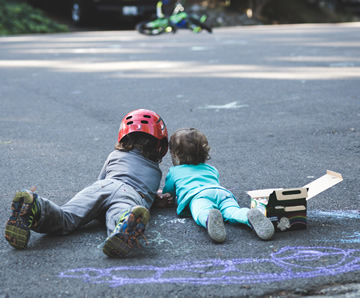It's not every day you see a newspaper headline "Go play on road", but that's exactly what we saw in The Herald Sun (Monday 8 June 2020).

Professor Matthew Nicholson was interviewed on Channel 9News the same day about how street play supports healthier kids. Also a terrific interview with our Executive Director, Barb Champion on Radio 6PR about encouraging more children back into our streets and the 1000PlayStreets movement, listen here.
There has been a lot of discussion since publishing, with many supporting neighbourhoods to reclaim their streets for children to play out the front and around their local streets.
So many adults have told stories of their days hanging outside with their friends and neighbours, riding their bikes on the road, playing cricket with rubbish bins as stumps and most of the time with no adult supervision. There was the obligatory call from mum to come inside for dinner!
Then there were others who said that it is dangerous and irresponsible to allow kids on the streets, that the roads are built for cars not children, it would be unsafe and most inconvenient for vehicles to navigate. Parents need to protect children from any possible risk or accident.
Evidence shows a steep decline in street play with 73% of adults saying they played on the streets when they were young, compared to only 24% of their kids Planet Ark
Australian children are facing a health crisis and it is time that we call it out and start looking for new and innovative ways to combat the declining mental and physical health of our kids. Strengthening communities and building stronger connections within neighbourhoods can also have a positive effect on children's wellbeing, including a greater feeling of safety, growing confidence and independence. Those friendships born across a neighbour's fences create social relationships and can develop a sense of belonging.

Did you know?
- 25% of children are overweight or obese
- anxiety related problems are increasing amongst children with an incidence 10 times that of diabetes
- 1 in 3 people have no neighbours they see or hear from on a monthly basis
- nearly 1 in 2 people have no neighbours they can call for help
So what better way to increase physical activity and reconnect neighbours than by creating Play Streets!
Play Australia has a vision that children, families, neighbours, pedestrians, bike riders and motorists are given equal priority on our quiet residential streets, to share these important community spaces in a safe and respectful manner every day of the week.
Today, in many suburban communities around Australia, outdoor spaces for play are limited due to lack of adequate green space in easy walking distance from home and shrinking backyards.
It has been reported that our Australian backyards today are less than a third of the size of backyards in the 1980s, and we are seeing more children residing in apartments and units than ever before, as our density of living increases.
In addition, the rise of technology and time spent on screens, means that our children spend too much time sitting and then overlay that with parental concerns over safety outdoors (i.e. potential injuries, stranger danger, traffic accidents) equals a generation of children with less opportunity to go outside and play.
In combination, these factors are having dire impacts on the health and wellbeing of our children, in fact experts are worried that with the rise of sedentary lifestyles and higher rates of obesity, we will have a generation of children who are facing a shorter life expectancy than their parents.
What is 1000 Play Streets?
‘1000 Play Streets’ is the movement Play Australia are leading to empower Australians to reclaim our quiet residential streets across Australia as places for neighbours to connect and play on a regular basis, to ultimately improve the health and wellbeing of individuals and communities.
Research commissioned by Play Australia has just been released by Latrobe University and Sport Australia. The Australian Physical Literacy Framework has highlighted there is a need to address the issues 'created by the rise of technology and the internet, increasing space pressures from housing densities and escalating safety concerns'.
In order to combat the decrease in active play and growing levels of sedentary behaviour, organised street play has been initiated both locally and internationally, encouraging children and families to get outside and connect with their neighbours through fun and inclusive physical activities
Centre for Sport and Social Impact, La Trobe University, 2020
We encourage you to read the research report and we'd love to know your thoughts.
- Tell us about how you played when you were young?
- Did you play around your local streets with neighbours and friends?
- Did you walk or ride to school?
- Why do you think parents are more risk averse today?
Please send any information you'd like to share to karen@playaustralia.org.au
Together we can build a healthier and happier future for our children.

Stay up to date
Sign up to our Play Today e-News to receive regular updates on our campaigns and how you can be involved and follow us on Facebook, Twitter, LinkedIn and Instagram




